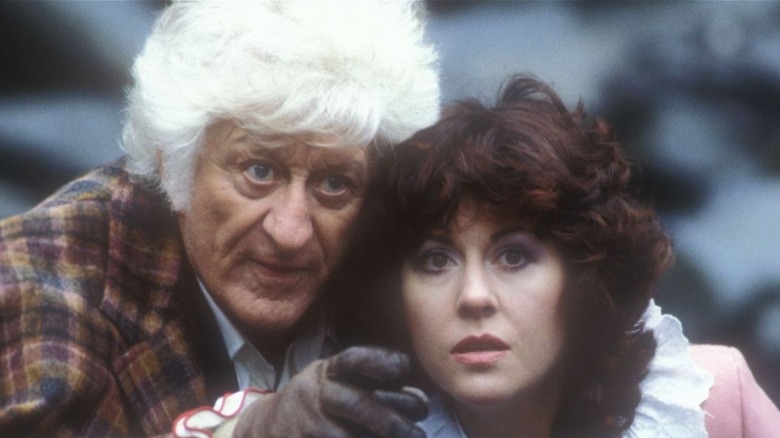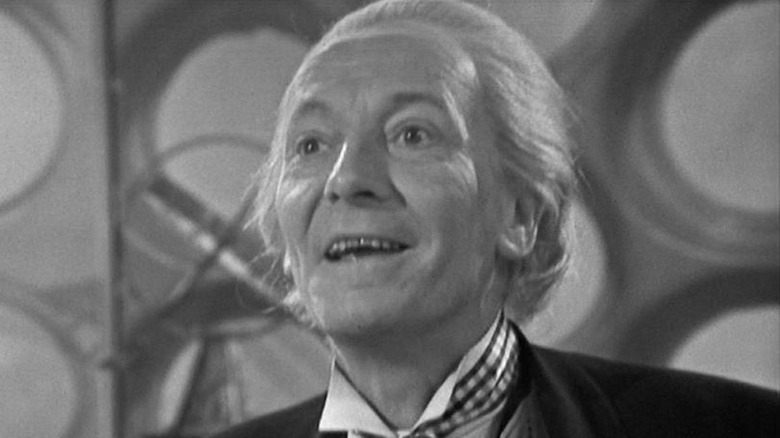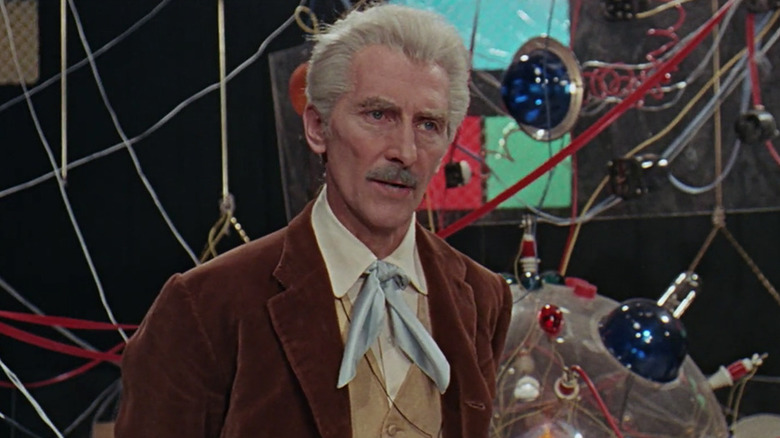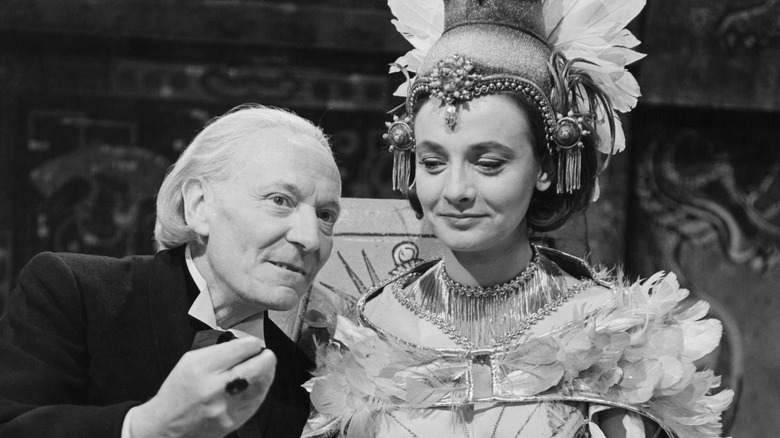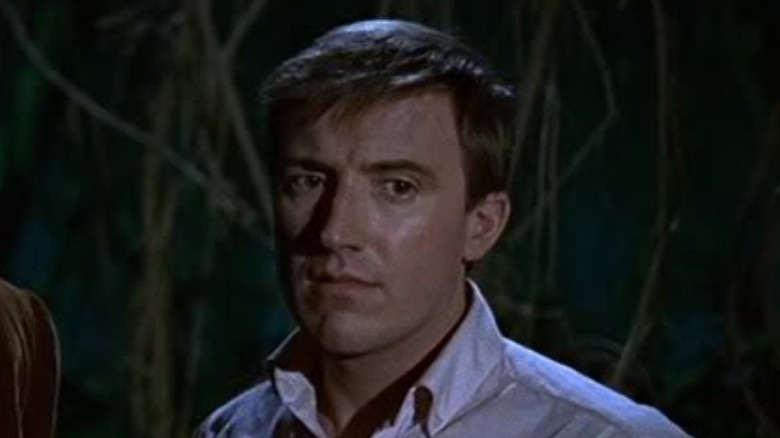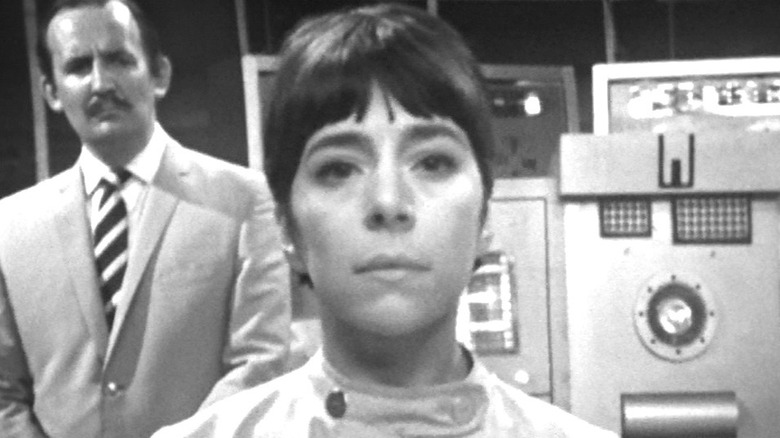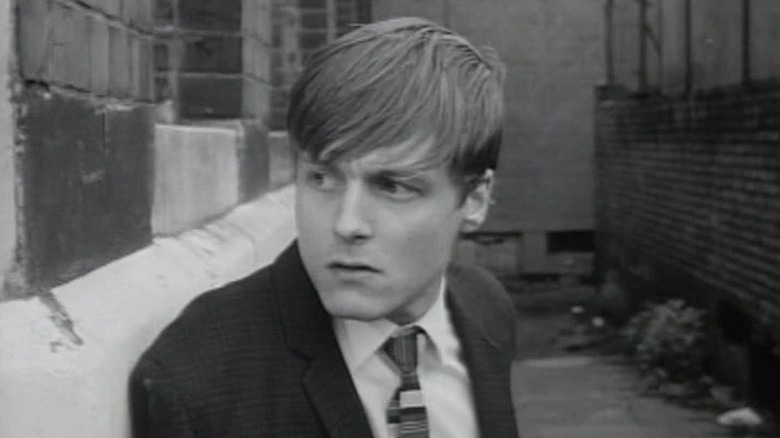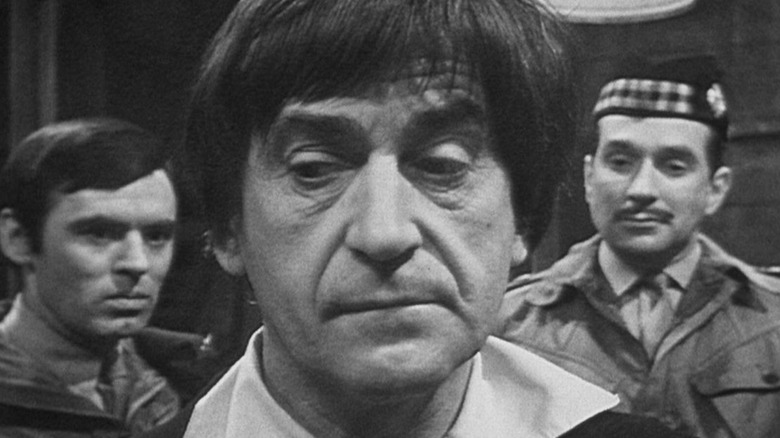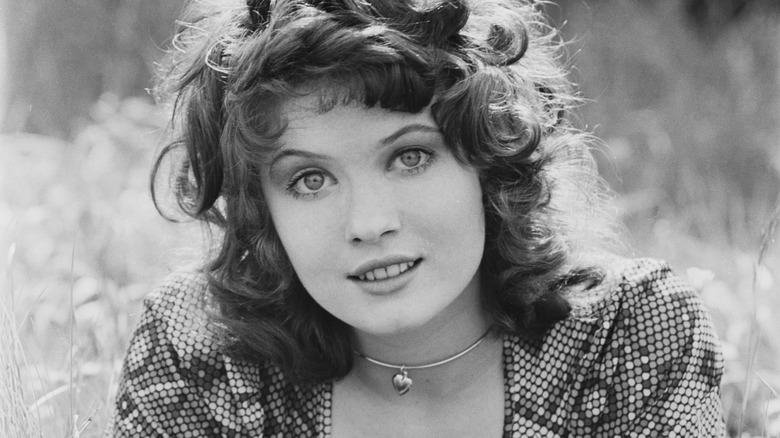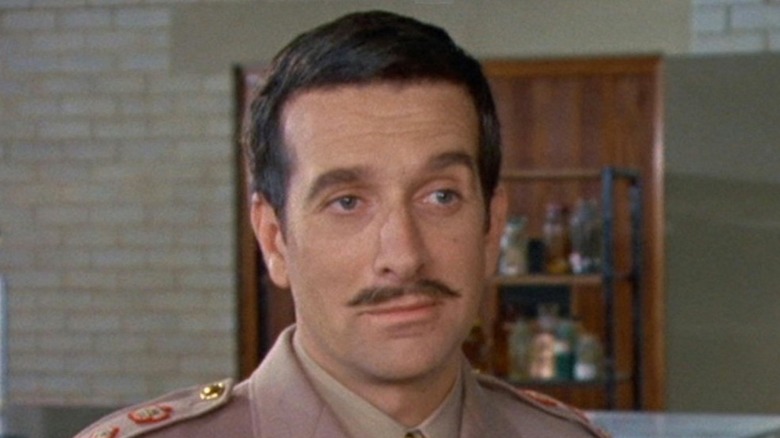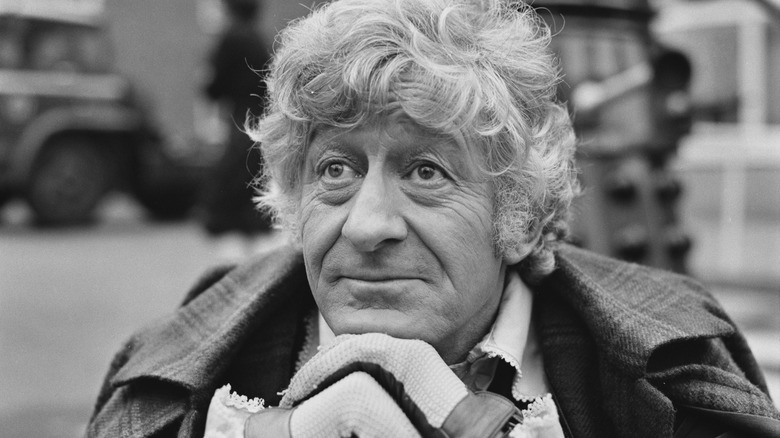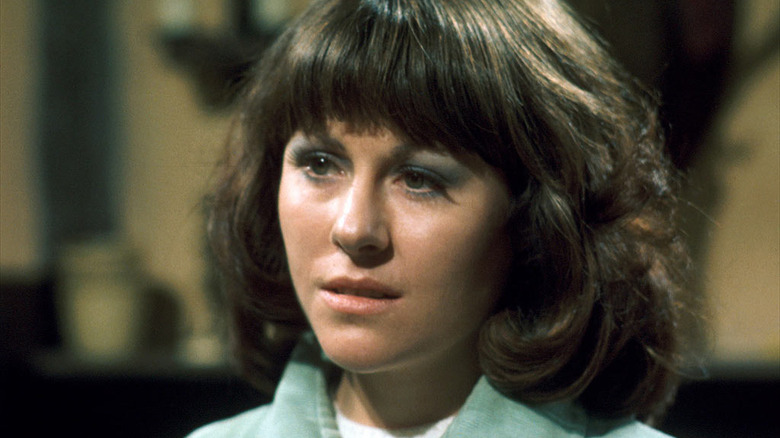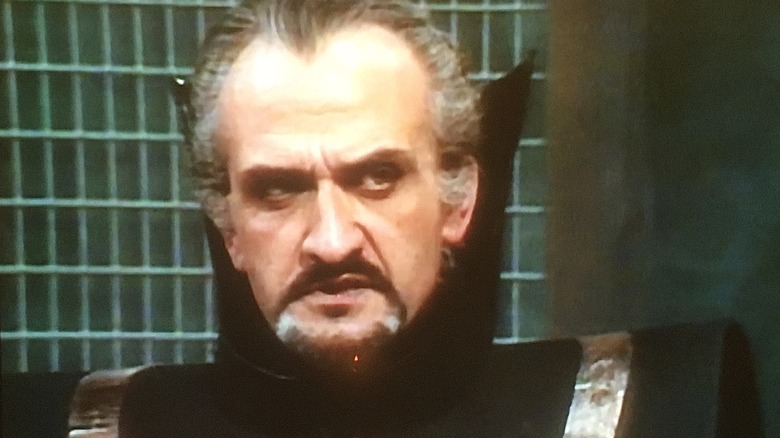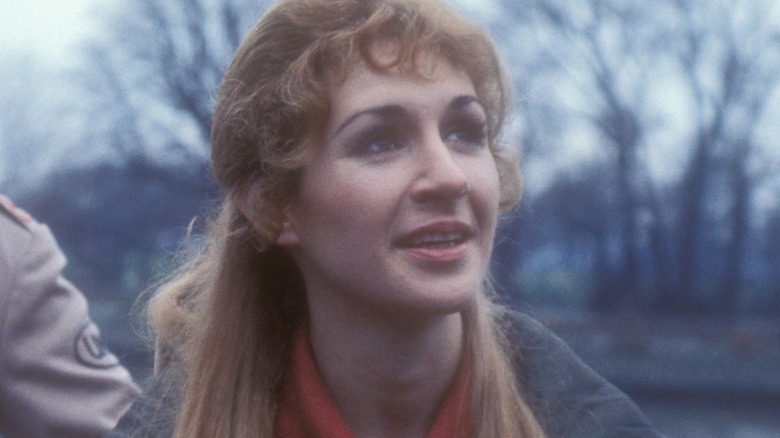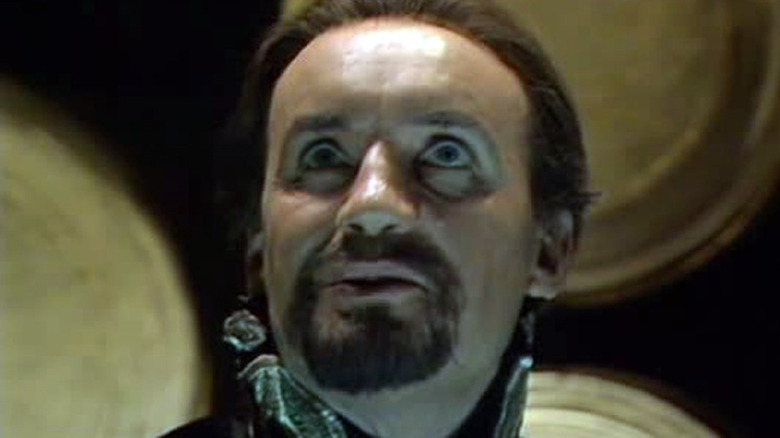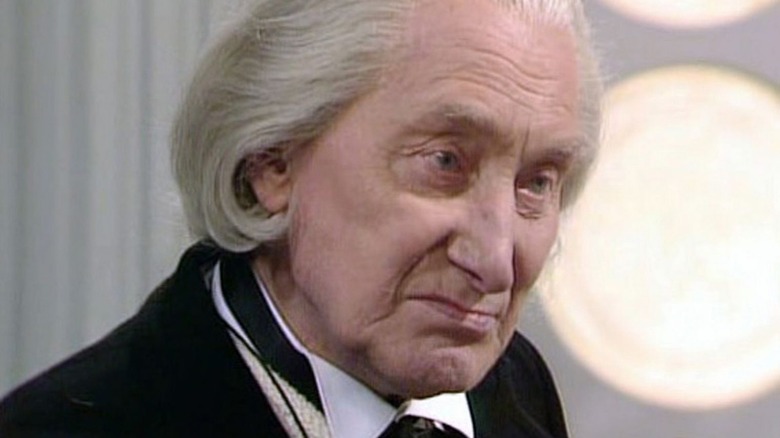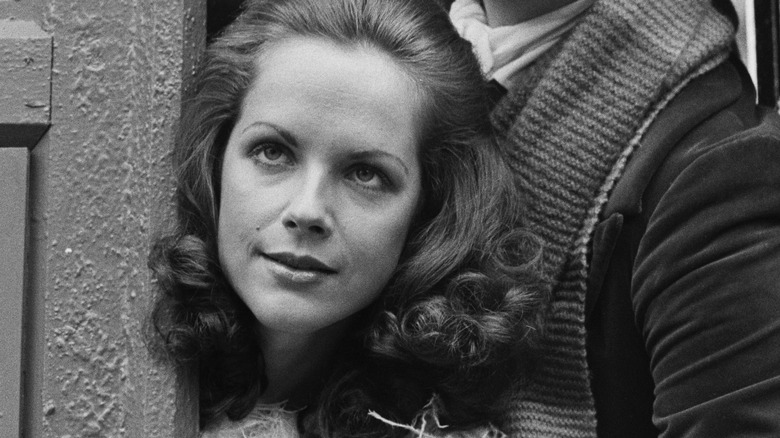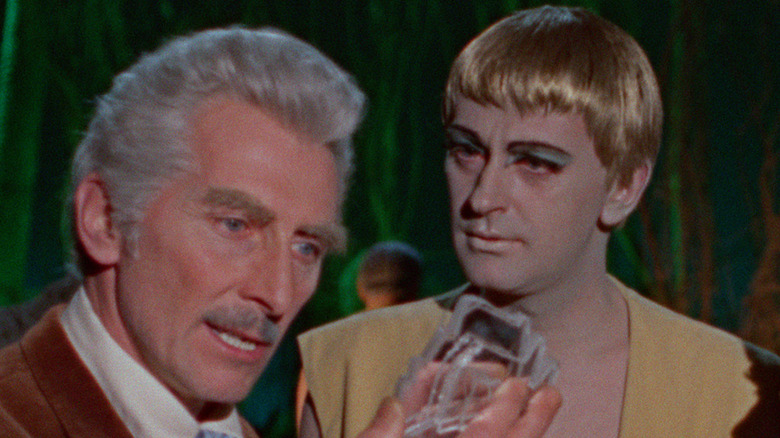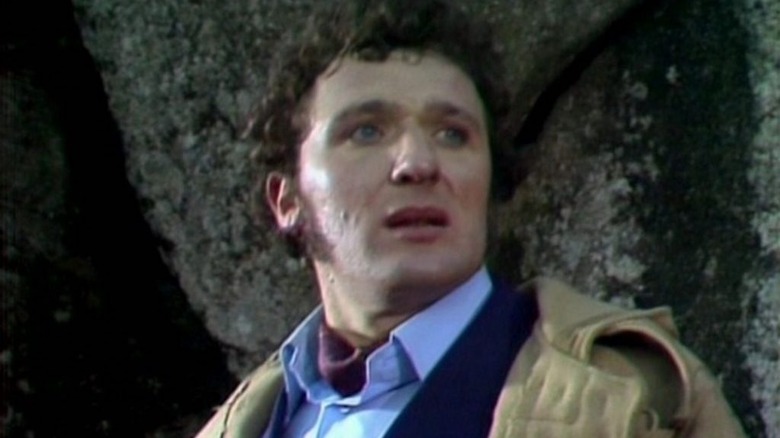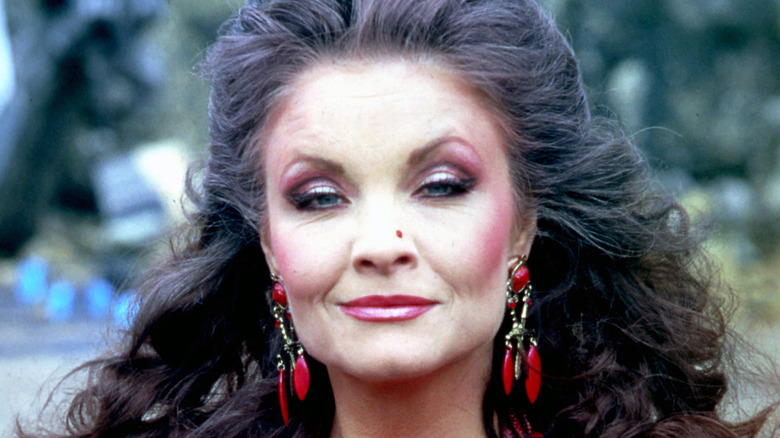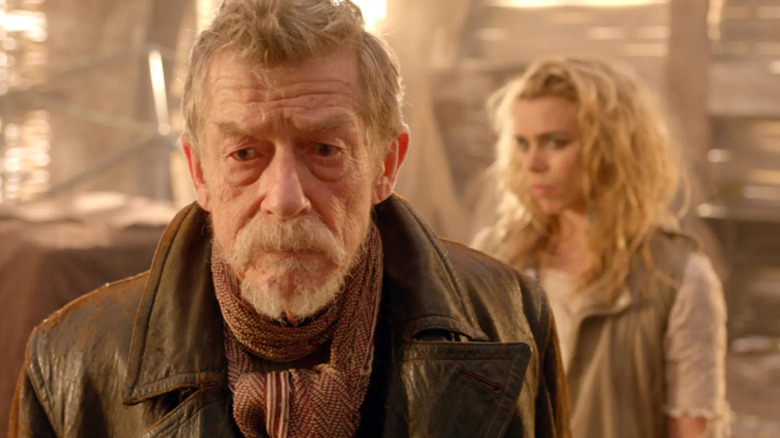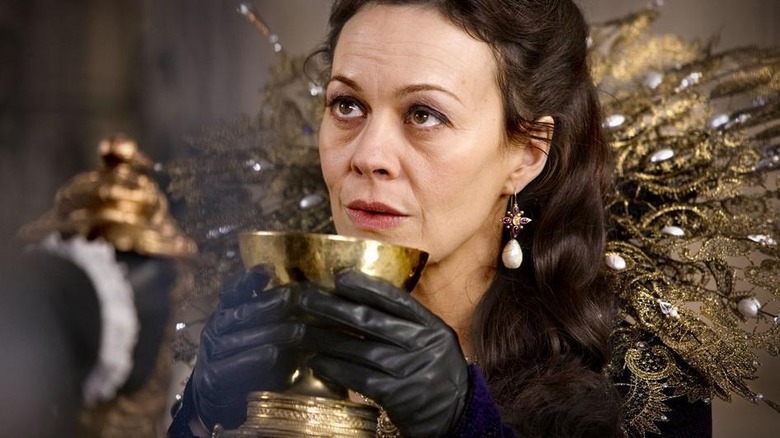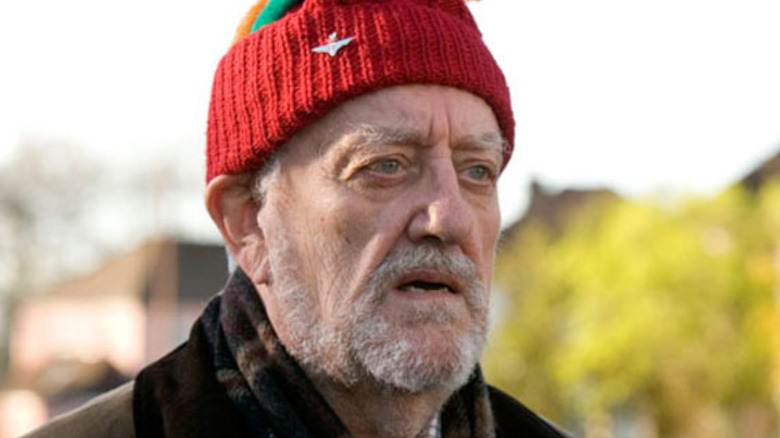Doctor Who Actors You May Not Know Passed Away
Debuting in 1963, "Doctor Who" ruled British television for decades, becoming a favorite of children and families for its fanciful sci-fi tales that took audiences through time and across the infinite cosmos. Thanks to the magic of television and the wonders of science fiction, the show's lead character — the enigmatic Time Lord known only as "the Doctor" — regenerates his body every few years, and a new actor takes over the role. By their side, each Doctor has faithful companions, assistants, and allies who help in their battles against alien menaces.
The series ran for more than 35 years before being canceled in 1989, following seven distinct Doctors and a few dozen companions. It didn't stay gone for long, though, and after a TV film in 1996, the full show returned in 2005, recovering its status as a uniquely British cultural phenomenon that remains popular all around the world. With some 60 years of stories, we've sadly lost many of the stars who passed through the Doctor's big blue police box. From Time Lords and companions to allies and foes, we're here to toast our dear departed friends from across time and space.
William Hartnell
As the actor who originated the role of the Doctor, William Hartnell is practically one of the patron saints of science fiction. While it might not be a surprise to learn that the man who first took on the role some 60 years ago has passed away, he left us far too soon. Despite the image that some fans may have of him as an old man — with long white hair and the stature of a pensioner — Hartnell was just 55 when he began playing the First Doctor.
Sadly, after just four years of playing the Time Lord, Hartnell's health began to decline, forcing him out of the series in 1966. In the 1972 celebratory serial "The Three Doctors," Hartnell returned one final time, uniting with the Second and Third Doctors for the anniversary special. However, he was confined to pre-recorded sequences in which his Doctor appeared via a monitor on the TARDIS.
Though his career spanned many decades, with roles in a number of feature films and TV series, Hartnell will forever be remembered for his signature role as the very first Doctor. He died in April of 1975 at the age of 67 after suffering a series of strokes. Though gone now for decades, his legacy will live forever across time and space.
Peter Cushing
Known for a number of iconic roles, Peter Cushing's career stretched across multiple genres. In the 1970s, he garnered fame for his role in a slew of horror films, including his performance as Van Helsing in several "Dracula" movies opposite Christopher Lee. He also played Sherlock Holmes in a series of TV stories. Of course, Cushing later gained worldwide notoriety for his role as Grand Moff Tarkin in George Lucas' "Star Wars."
Less commonly known, however, is that Cushing actually played the Doctor in a pair of feature films released not long after the series began airing: "Dr. Who and the Daleks" and "Daleks' Invasion Earth 2150 A.D." The films were controversial among a certain segment of the fandom for the changes they made to the mythology, as well as for recasting the show's biggest roles. But Cushing's version of the Doctor still has plenty of fans, as he presented the first opportunity for viewers to see their favorite time-traveling hero in color up on the big screen.
Diagnosed with cancer in 1982, Cushing stayed active into the late 1980s but was mostly retired as the next decade dawned. The legendary star passed way in August of 1994 after admitting himself to a hospice center in Canterbury, England.
Jacqueline Hill
Jacqueline Hill appears in the very first episode of "Doctor Who" as Barbara Wright, the schoolteacher of the Doctor's granddaughter, Susan. After discovering Susan's true alien origins, she ends up joining her and the Doctor on a number of adventures, becoming one of the original companions.
Hill played Barbara for 40 episodes in Season 1 and an additional 34 in Season 2, outlasting Susan's own presence on the show. She departed in "The Chase," a story that saw the Doctor face off with a group of time-traveling Daleks. Hill made a triumphant return a decade and a half later in the 1980 serial "Meglos," though it was in an entirely different role — that of a Tigellan priestess named Lexa. Outside of "Doctor Who," she appeared in a number of dramas on television, including the telefilm "Blood Money," written by "Twilight Zone" creator Rod Serling and co-starring Michael Caine and Sean Connery. Hill died of cancer in 1993 at the age of 63.
Roy Castle
When "Doctor Who" proved too popular for just the small screen, the series made the leap to film with Peter Cushing in the title role for "Dr. Who and the Daleks." In addition to the Doctor, all three companions were recast, with new actors stepping into the roles of Susan Foreman, Barbara Wright, and Ian Chesterton. The latter was played by Roy Castle, a young actor who went on to become a singer, dancer, and comedian with a long and varied career.
Following his role as Ian in the 1963 film, Castle became best known for his role as the host of the British TV program "Record Breakers," a show produced in conjunction with the Guinness Book of World Records. Each week, the program featured people attempting to break world records and performing all kinds of amazing feats. In addition to hosting the series from 1972 until 1993, Castle competed and held nine records himself, including one for the fastest tap dance.
Castle left "Record Breakers" after being diagnosed with lung cancer and helped found the Roy Castle Lung Cancer Foundation. He died on September 2, 1994.
Jackie Lane
While the role of the Doctor requires a fanciful sci-fi explanation every time a new actor steps into the role — that being his regeneration — nothing of the sort is needed when the show needs a new companion. Any time an actor wishes to exit the series, a new one comes in. In 1966, Jackie Lane boarded the TARDIS as Dorothea Chaplet, better known by her nickname "Dodo."
Though she appeared in 19 episodes of the series alongside First Doctor William Hartnell, just a little more than half of them have survived to today. The rest lie among the many lost episodes of "Doctor Who." After she left the series, Lane went on to work as a talent agent, specializing in voice-over work. One of her most notable clients was the Fourth Doctor himself, Tom Baker. Lane passed away in June of 2021 at the age of 79.
Michael Craze
Michael Craze came into "Doctor Who" in the Season 3 serial "The War Machine" as seaman Ben Jackson, one of the First Doctor's final companions. Ben later became one of the first companions — along with Polly (Anneke Wills) — to stick with the series through the Doctor's regeneration. Following William Hartnell's departure and Patrick Troughton's first full episode, "The Power of the Daleks" in 1966, Craze remained, ultimately appearing in nearly 40 installments and exiting the show in 1967.
Ben and Polly both left the series in "The Faceless Ones," having been brought back to their time by the Doctor after a number of exciting adventures aboard the TARDIS. After his time on "Doctor Who," Craze had a long career in television, appearing in shows like "Z-Cars" and the medical drama ironically titled "The Doctors." He died from a heart attack in 1998 at the age of 56.
Patrick Troughton
To replace the outgoing First Doctor William Hartnell, producers turned to veteran character actor Patrick Troughton, who not only ably handled the part but became a fan favorite in his own right. A World War II veteran, Troughton stayed in the role for three full seasons and well over 100 episodes. He turned the Doctor from a kindly father figure into a shabby, tramp-like character, proving the concept of regeneration could work.
During his tenure as the Second Doctor, the series blossomed and came into its own as an enduring icon of British television. It was during this era that the show established many of its more famous hallmarks, like the Doctor's odd eccentricities (such as playing a recorder), now-iconic adversaries like the Ice Warriors and The Great Intelligence, and the Earth-based organization U.N.I.T.
"Doctor Who" was hardly Troughton's only claim to fame, however. He had numerous appearances in "The Adventures of Robin Hood," and in big-screen classics like "Jason and the Argonauts," "The Omen," and Laurence Olivier's "Hamlet." Troughton returned to "Doctor Who" three times after stepping down, appearing in the 10th-anniversary episode "The Three Doctors," the 20th-anniversary special "The Five Doctors," and the 1985 serial "The Two Doctors." He was also very active on the "Doctor Who" convention circuit. Troughton died after suffering a heart attack in 1987.
Deborah Watling
Not every one of the Doctor's companions is a 20th-century youngster. During the time of the Second Doctor, Patrick Troughton was joined by a pair of assistants who hailed from eras past. In addition to Frazer Hines as the Scottish highlander Jamie, actress Deborah Watling joined the series in Season 4's "The Evil of the Daleks" as Victoria Waterfield, a native of 19th-century England and the daughter of a scientist who'd been experimenting with time travel.
Watling remained by the Doctor's side during some of the most famous stories of the era, including "The Tomb of the Cybermen," "The Ice Warriors," and "The Web of Fear." After her exit from the series in "Fury from the Deep," Watling had a brief career as a shop owner before securing a role alongside her father on the soap opera "The Newcomers."
In 1993, Watling reprised her role as Victoria in a charity spot, "Dimensions in Time." She also played herself in the 2013 50th-anniversary short "The Five(ish) Doctors Reboot" alongside Sylvester McCoy, Peter Davison, and Colin Baker. In 2017, Watling passed away at the age of 69, not long after being diagnosed with lung cancer.
Nicholas Courtney
Nicholas Courtney never became one of the Doctor's official companions, but in the role of Brigadier Lethbridge-Stewart, he was without a doubt one of the Doctor's greatest allies, aiding the Time Lord through multiple regenerations across more than 40 years. First appearing in 1968's "The Web of Fear," he helped the Second Doctor against The Great Intelligence, the Third Doctor against the Master, the Fourth Doctor against the Zygons, and the Seventh Doctor against the sorceress Morgaine. All told, Courtney made more appearances than nearly any other guest actor in the franchise, turning up in over 100 episodes.
While he didn't appear in "Doctor Who" proper upon the series' return in 2005, Courtney did come back to the role in a series of audio dramas from Big Finish. He reprised the part on screen one last time in a 2008 episode of the spin-off series "The Sarah Jane Adventures." The Brigadier's legacy has lived on through his daughter, Kate Stewart, who succeeds him as head of U.N.I.T. in the modern series.
Courtney had a modest career outside of "Doctor Who," but it's his role as the Brigadier that etched his name into sci-fi history. He passed away in 2011 at the age of 81.
Jon Pertwee
Perhaps more than any Doctor before him, Jon Pertwee was already a well-known actor when he took on the role of the Third Doctor, having appeared in more than two dozen films. He'd even appeared with William Hartnell in the 1953 comedy "Will Any Gentleman...?" After joining the series in 1970, he spent four years in the role and filmed more than 125 episodes.
Pertwee's time leading the series also marked a new era for the show, as the Doctor became trapped on 20th century Earth, with many stories seeing him allied with U.N.I.T. to fight off various alien threats to the planet. With Pertwee's presence and a new format, "Doctor Who" became almost like a sci-fi "James Bond" show. Stories were more action-packed, with fast-paced adventure, thrilling chase sequences, and plenty of gunplay. This era was also the first to broadcast the series in color.
After Pertwee departed the series in 1973, he went on to star in the series "Worzel Gummidge" alongside Una Stubbs, Connie Booth, and fellow "Who" actor Bernard Cribbins. He returned to the role of the Third Doctor one final time for a special feature on a 1995 home video release titled "Devious." Pertwee left behind a towering legacy in and out of "Doctor Who" when he died 1996.
Elisabeth Sladen
When it comes to classic "Doctor Who" companions, few compare to beloved adventurer Sarah Jane Smith, played by Elisabeth Sladen. Sladen joined the program in 1973 after several successful years on TV shows like "Coronation Street" and "Z-Cars." She aided the Third Doctor in the final year of his tenure and stayed with Tom Baker's Fourth Doctor for three more years.
Several years after leaving the series, Sladen filmed a pilot for her own show, "K-9 and Company: A Girl's Best Friend" in 1981, which paired her with the Doctor's robot dog. However, a full run was never commissioned. She got her chance nearly 30 years later, though, following a surprise return in the 2007 episode "School Reunion." This led to her starring in the spin-off series "The Sarah Jane Adventures." Like many "Who" alum, Sladen reprised her role in various Big Finish audio dramas, even leading her own series of new stories. Sladen passed away in 2011 at the age of 65 after a cancer diagnosis earlier that year.
Roger Delgado
Ask any Whovian to rattle off a list of the greatest villains in "Doctor Who," and you're likely to get the Doctor's nemesis the Master somewhere near the top of the list, right after the Daleks. But perhaps surprisingly, the rival Time Lord didn't actually make his debut until the era of the Third Doctor in 1971, in the serial "Terror of the Autons," played by the masterful Roger Delgado. Decked out in a goatee, Delgado imbued this new adversary of the Doctor with unrivaled scheming villainy.
A veteran of both stage and screen, Delgado got his start in the 1950s, with one of his earliest roles being Athos in a British adaptation of "The Three Musketeers." He was later cast in classics like "The Third Man," "Danger Man," and "The Saint," before originating the role of the Master.
After appearing in several "Doctor Who" serials opposite Jon Pertwee, Delgado was tragically killed in a car accident while on the set of another production in Turkey in 1973. he was only 55 years old. In the years after, Pertwee remarked that Delgado's death was a big part of the reason for his decision to leave the series.
Caroline John
Like many actors who've played companions to the Doctor, Caroline John had a healthy filmography outside of the series, but she'll forever be remembered for her role aboard the TARDIS. John starred as scientist Liz Shaw, a civilian member of the Earth-based research and defense organization U.N.I.T.
Liz first appears as a protege of sorts to U.N.I.T. commander Brigadier Lethbridge-Stewart in "Spearhead from Space," recruited from Cambridge for her expertise on outer space objects and her vast knowledge of adjacent sciences. A classic skeptic, Shaw eventually becomes a key ally in the fight against the Silurians, Autons, and other threats to the Earth.
John's role in "Doctor Who" was actually one of her earliest on-screen performances. She left the series after one season and went on to a long career, mostly making guest appearances in shows like "Z-Cars" and "Casualty." In 2003, she even had a small role in the rom-com classic "Love, Actually." Her final performance came in 2008 on the soap opera "Doctors," before her passing in 2012 at the age of 71.
Anthony Ainley
The untimely death of Roger Delgado didn't spell the end of his character the Master. After various appearances from actors under heavy prosthetics, the Master came back properly at the end of the 1981 story "The Keeper of Traken," where he was played by Anthony Ainley, former star of the ITV crime drama "Spyder's Web." Ainley returned many more times in the role, facing off against several different Doctors including Tom Baker, Peter Davison, Colin Baker, and Sylvester McCoy.
As the longest-tenured actor to play the Master, Ainley holds a unique record. He was also the first iteration to clash with multiple Doctors, right up until John Simms' return in 2017. Ainley departed the role only after the series was canceled in 1989, with producers replacing him with Eric Roberts for the 1996 telefilm. He reprised the role for a 1997 video game. Ainley died in 2004, just a year before the franchise's triumphant return to television.
Richard Hurndall
Joining the "Doctor Who" franchise at the age of 72, actor Richard Hurndall was cast to play the First Doctor in the 20th anniversary special "The Five Doctors," which saw all five Doctors at the time appearing together in one adventure. He was chosen to replace the late Richard Hartnell, and he'd already cut his teeth on the competing sci-fi series "Blake's 7," in which he played a similarly wise mentor figure.
Stepping into such an iconic role was no easy feat for the actor, but the special episode has become an iconic story in the long-running series, and the only one to unite more than three separate incarnations of the character. While Hurndall doesn't quite duplicate Hartnell's iconic spark, he does manage to capture the First Doctor's fatherly tone. In his broader career, Hurndall acted on television and film but found a longtime home performing in radio dramas. In 1959, he played Sherlock Holmes in an adaptation of "The Sign of Four," and he continued acting on BBC radio into the late 1970s.
Hurndall died in April of 1984, not long after the transmission of his first and only appearance in "Doctor Who."
Mary Tamm
Actress Mary Tamm joined "Doctor Who" as the Fourth Doctor's companion Romana in the story called "The Ribos Operation." Romana was the first companion since the Doctor's granddaughter Susan to be a fellow Time Lord, and she became central to the show's exploration into season-long stories. Tamm's role kicked off the "Key to Time" arc that ran through the entirety of Season 16, through six serials and 26 episodes.
This arc includes "The Pirate Planet" and "The Armageddon Factor," both written by "The Hitchhiker's Guide to the Galaxy" author Douglas Adams. At the conclusion of Season 16, Tamm chose not to return, with actress Lalla Ward replacing her in the role after the character's death and regeneration into a new body.
A regular on English television, Tamm was a veteran of classics like "Coronation Street" and "Return of the Saint" when she joined the series. After her departure, she featured in countless more, including "Casualty," "The Bill," and the bizarre time travel show "Crime Traveller." She gave her final TV performance on "EastEnders" in 2009 before her passing in 2012 after a battle with cancer.
Barrie Ingham
Actor Barrie Ingham may be recognizable to fans of "Star Trek" as much as "Doctor Who" thanks to his role in a Season 1 episode of "Star Trek: The Next Generation." But back in the 1960s, the actor had the rare distinction of playing characters in both the original "Doctor Who" TV series and its big-screen adaptation, "Dr. Who and the Daleks."
In 1965, Ingham starred in the Season 3 serial "The Myth Makers" alongside William Hartnell's First Doctor. In the story, the Doctor travels to ancient Greece, where he first meets his new companion Katarina in the city of Troy. In a retelling of Homer's "Iliad," Ingham plays Paris, son of Priam. That same year, Ingham starred in the Peter Cushing "Dr. Who" film as Alydon, the leader of the peaceful Thal race.
Besides "Doctor Who," Ingham might be best known as the voice of Basil in Disney's "The Great Mouse Detective." After a long and successful career in film, television, and the theater — where he was a longtime member of the Royal Shakespeare Company — Ingham died in 2015 at the age of 82.
Ian Marter
The companions on "Doctor Who" have often been chosen to help balance out the Doctors themselves. Such was the case with actor Ian Marter, who was hired following the departure of Jon Pertwee with the idea that he could serve as a young, action-oriented lead to balance out the more stately, older actor they were planning to hire as the Fourth Doctor. A relative newcomer to the screen, Marter was the first man in mind when the show came looking for a new, younger companion.
Unfortunately, after the casting of Tom Baker, who proved much more lively than the producers had initially envisioned, Marter's character was quickly written off, as he too often competed for scenes with the gung-ho Fourth Doctor. Following his exit, Marter appeared in a recurring role on "Crown Court," and later in the telefilm "The Return of Sherlock Holmes." Not long after, the actor died unexpectedly in 1986 at the all-too-young age of 42.
Kate O'Mara
In the 1980s, the Doctor faced off against a new adversary: a devious villainess called the Rani. Though she only appeared in six episodes across two serials, she did manage to clash with two different Doctors and become one of the most famous foes he'd ever face thanks to an indomitable performance from Kate O'Mara. While the '80s era of "Who" has its critics, few will find fault with O'Mara's Rani, a quintessential recurring villain who's every bit the Doctor's equal.
Before "Doctor Who," O'Mara was already well-known for her work on the stage, having performed in numerous Shakespeare productions including "Much Ado About Nothing" and "The Taming of the Shrew." She was known for appearances across television too, from "The Saint" to "The Avengers" and "Z-Cars." During her years as the Rani, O'Mara also secured a recurring role in the American soap opera "Dynasty" and became a semi-regular on "Howards' Way." In the 2000s, she appeared in "Absolutely Fabulous" and "Doctors," while continuing to perform on the stage. In 2014, O'Mara died of ovarian cancer at the age of 74.
John Hurt
In 2013, renowned big-screen star John Hurt joined "Doctor Who" as a previously unseen incarnation of the Doctor himself, starring in the 50th anniversary telefilm "The Day of the Doctor." In the episode, Hurt plays the so-called "War Doctor," who must unite with the Tenth and Eleventh Doctors (David Tennant and Matt Smith) to save his home planet Gallifrey from total annihilation at the hands of the Daleks.
As one of the most distinguished British actors in Hollywood, Hurt's presence brought a tremendous gravitas to the episode. Some of the many classic movies Hurt appeared in include "Alien," "1984," and the "Harry Potter" films.
But Hurt's on-screen career stretched back decades, starting with a 1962 episode of "Z-Cars." In 1976, he played the Roman emperor Caligula in the TV miniseries "I, Claudius," and he was nominated for an Academy Award for his performance in the David Lynch masterpiece "The Elephant Man" four years later. In the 2000s, he played important roles in "Hellboy," "V for Vendetta," and "Indiana Jones and the Kingdom of the Crystal Skull." Hurt died in 2017 at the age of 77.
Helen McCrory
John Hurt isn't the only "Harry Potter" alum to appear in "Doctor Who," with actress Helen McCrory — who played mother Narcissa Malfoy — preceding him by a few years with a leading role in the 2010 episode "Vampires in Venice." In that story, the Eleventh Doctor (Matt Smith) travels to 16th-century Italy, where he believes a group of deadly vampire women is abducting innocent people. McCrory plays Rosanna, the leader of the aliens hiding in a human disguise.
Oddly enough, McCrory made one of her first big-screen appearances in 1994's "Interview with the Vampire" before her roles in "The Queen" and "The Count of Monte Cristo." She ultimately appeared in three "Harry Potter" films, while on television she had major roles in "Peaky Blinders" and "Penny Dreadful," as well as leading roles in "Fearless" and "Roadkill." When she died in 2021, it was revealed by her family that she had been dealing with a cancer diagnosis privately. She was 52 years old.
Bernard Cribbins
Bernard Cribbins is well known for his recurring role as Wilfred Mott, Donna Noble's grandfather, in the modern revival of "Doctor Who." But what only the most diehard Whovians may know is that Cribbins actually joined the franchise some 40 years earlier. In 1966, he starred alongside Peter Cushing in "Daleks' Invasion Earth 2150 A.D.," the big screen sequel to "Dr. Who and the Daleks."
In the film, Cribbins plays new companion Tom Campbell, a local policeman who joins the Doctor and Susan on their adventure. Following his appearance in the film, Cribbins earned roles in the 1967 James Bond comedy "Casino Royale" and Alfred Hitchcock's "Frenzy." On television, Cribbins had a lengthy career, turning up in episodes of "The Avengers," "Fawlty Towers," and even his own series "Cribbins" in 1969. He provided the voices for the iconic children's series "The Wombles" beginning in 1973, and took on the role of the storyteller in more than a hundred episodes of "Jackanory."
Cribbins died in 2022at the age of 93, leaving behind a body of work that spans more than 75 years.
